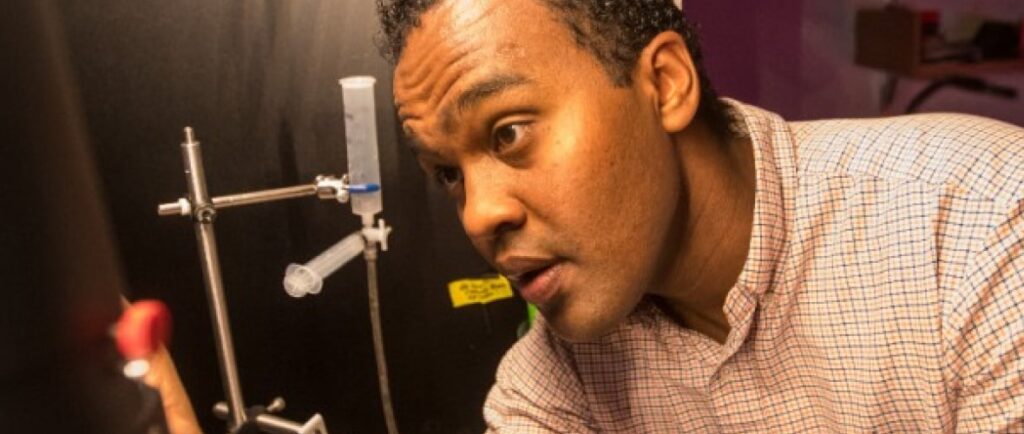
Arif A. Hamid, PHD
Assistant Professor of Neuroscience, University of Minnesota
Hanna Gray Fellow, Howard Hughes Medical Institute
4-160 Jackson Hall, 321 Church Street, Minneapolis, MN 55455
Education and Training
2016-2021 Postdoctoral Fellow/HHMI Hannah Gray Fellow
Brown University, Mentors: Dr. Michael Frank and Dr. Christopher Moore
2011-2016 Ph.D. - Neuroscience
University of Michigan, Ann Arbor, Mentor: Dr. Joshua Berke
2008-2010 B.S. - Neuroscience
University of Minnesota
2017 Specialized course: Imagining Structure and Function, CSHL, Cold Spring Harbor, NY
2014 Specialized course: Okinawa Computational Neuroscience, OIST, Okinawa, Japan
2010 Specialized course: Neural Systems and Behavior, MBL, Woods Hole, MA
Arif Hamid, PhD, assistant professor in the Department of Neuroscience and Hanna H. Gray Fellow at the Howard Hughes Medical Institute, joined the University of Minnesota Medical School’s Medical Discovery Team (MDT) on Addiction Nov. 1. His laboratory will look at the underpinnings of the circuit mechanisms in the brain that help facilitate adaptive decision making and the ways in which the neurotransmitter dopamine affects motivation and learning.
Dr. Hamid completed his undergraduate degree at the U of M, where he was first exposed to neuroscience laboratories, and received his PhD in neuroscience from the University of Michigan. He was then a postdoctoral fellow at Brown University, where he was able to grow as an independent thinker and refine his research.
“I’d always been curious about how the brain coordinates how we behave as reasonable agents in the world,” Dr. Hamid said. “These questions have captivated my interest over the years, and they are what I study in my own laboratory now. To start, we will be building on my initial trajectory which asks a couple of really important questions which are, at the broadest level, what are the brain circuits that help us learn from, plan and execute goals? And, how do they interact physiologically to perform computations, or operations, in order to produce a range of behaviors that we call adaptive flexible behaviors?”
His laboratory uses cutting-edge methods to look inside the brain with high levels of precision. This research has many applications beyond the mere understanding of the neurocircuitry behind the ways in which we react and adapt to our environments. In deconstructing the human brain and understanding the different internal circuit connections, researchers can gain a deeper understanding of why addictions arise as well as other neurological or behavioral problems.
“There are a lot of direct connections between our mechanistic studies on the basic biology of how the decision-making system operates, and how, if those circuits break or misalign, you then generate a host of disorders that are very debilitating, such as substance abuse or psychiatric disorders,” Dr. Hamid said.
“Moreover, our experiments systematically test the predictions of computational models of decision making and behavior. Thus, by providing experimental evidence for the algorithms biological brains use to solve challenging problems, our studies are an important platform for the development of the next generation of biologically-inspired artificial intelligence,” Dr. Hamid said.
Significant Contributions
Lorem ipsum dolor sit amet consectetur adipiscing
Lorem ipsum dolor sit amet consectetur adipiscing
Lorem ipsum dolor sit amet consectetur adipiscing
Lorem ipsum dolor sit amet consectetur adipiscing
Honors and Awards
2024
UMN Graduate Program in Neuroscience, Award for Advancing Diversity, Equity and Inclusion
2021
Allen Institute for Brain Science, Next Generation Leader
2021
Univ of Minnesota Medical School ECRA Award
2020
Cell Press, 100 Inspiring Black Scientists in America
2019
NIH Office of the Director, Rising Star Award
2017-2025
Howard Hughes Medical Institute, Hanna H. Gray Fellowship
2017
Cold Spring Harbor Laboratories, Helmsley Fellowship
2016
University of Michigan Graduate Program in Neuroscience, Award for Outstanding Doctoral Thesis
2014
Okinawa Institute of Science and Technology, Travel Grant
2013
Gordon Research Conference, Travel Fellowship
2011-2013
University of Michigan, Rackham Merit Fellowship
2011
University of Michigan, Rackham Merit FellowshipUniversity of Minnesota, Luis Stokes NorthStar STEM Alliance Fellowship
Support Our Science
Curious about how you can make a difference or have questions about our research? We’re eager to connect and explore possibilities together. Just click the button below to start the conversation — we can’t wait to hear from you!
